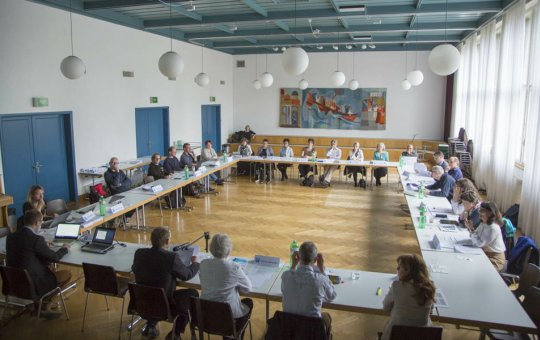In her welcoming address Ruth Pfister, member of the Council of the FSPC, underscored: “I find it important that in your church political activity, you grapple intensively with various issues of diaconia, search for common ground, and agree on courses of action and procedures”. She also noted that a shared basic consensus in educational matters promotes mutual understanding “and makes us transparent and reliable – also for our new recruits in Diaconia”.
Among other things, the Plenary Assembly discussed the current state of Diaconia Switzerland’s four working groups. The groups “Projects and Praxis”, “Foundations and Research”, “Training and Continuing Education”, and “Churches and Works” reported on their current operations. The working group on projects and praxis is engaging with the subject of “Caring Communities” by collecting materials and organizing a conference. This working group is in close contact with the Specialized Group on Palliative Care, which will hold a conference on the same topic in the autumn of 2018.
The Survey “Diaconia and the Social Diaconate in the Cantonal Churches”
Most of the cantonal churches in German-speaking Switzerland rely on the “Minimum Requirements for Social Diaconia Recognition” when deciding on the recognition and hiring of social deacons/deaconesses, and in diaconia matters in general. The working group “Projects and Praxis” of Diaconia Switzerland would now like to conduct a survey within these churches in order to better understand the current state of social diaconia. The first survey was conducted five years ago.
The survey’s questionnaire asks about the basic understanding of diaconia in the churches and the profession of social diaconia, the minimum requirements for it, and employment conditions and structures. A test phase with three different-sized churches has been completed, and in the next few weeks the churches of German-speaking Switzerland will be surveyed. Coordination with the churches in French-speaking Switzerland is also planned. The results will be presented to the Plenary Assembly in November 2018.
Examples from Praxis
Other examples of praxis were also presented at the Assembly, for example the projects “Maison de la Diaconie” from the Canton of Vaud and the Certificate of Advanced Studies program CAS in diaconia animation in St. Gallen. According to Vaud synodal councillor Pascale Gilgien, the former envisions the opening of an emerency shelter – a “hall of solidarity” and a space for spirituality – by the Reformed Church of the Canton of Vaud. This will house people looking for short-term accommodation such as released prisoners, victims of domestic violence, rejected asylum seekers and others.
The CAS program in diaconia animation at the St. Gallen University of Applied Sciences aims at empowering people to help others in precarious life situations. Graduates will be able to recognize concrete need in their communities and implement projects that help people in poverty. The program provides the knowledge and skills necessary for these activities. According to delegate Maya Hauri Thoma this course, which leads to a Certificate of Advanced Studies and which costs CHF 5600, focuses on project work.
Diaconia Switzerland
The Conference of the Federation of Swiss Protestant Churches, established in 2017, brings the Conference on Diaconia, the Diaconate Conference of German-speaking Switzerland, and the project diakonia.ch together under one roof. Diaconia Switzerland promotes the exchange of information on social diaconia projects at the parish level, cultivates dialogue with diaconia research and networks, and sets the standards for social diaconia education. This ensures that there is a single platform for coordinating diaconia work.
Author
Diaconia Switzerland / Thomas Flügge
